- Research
- Research Centers
- Journals
- Admission
- Introduction
- Programs
- Application
- Alumni & Giving
- Alumni Club
- Giving
Themed “Inclusive, Shared and Sustainable Development — Global Perspectives”, the Conference of the Consortium for Country and Area Studies (CCAS) took place online on Dec 18. Beijing Foreign Studies University (BFSU) served as the hosting institution.
Initiated by the Global Alliance of Foreign Studies Universities (GAFSU) with the motto of “Better Understanding, Better World”, the CCAS gathered a network of experts from 181 countries, who speak more than 100 different languages, and tapped their expertise to strengthen the systematic study of country and area issues, global governance system reform, and pertinent global challenges.
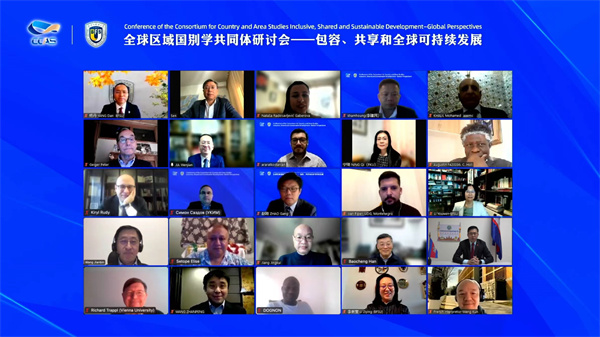
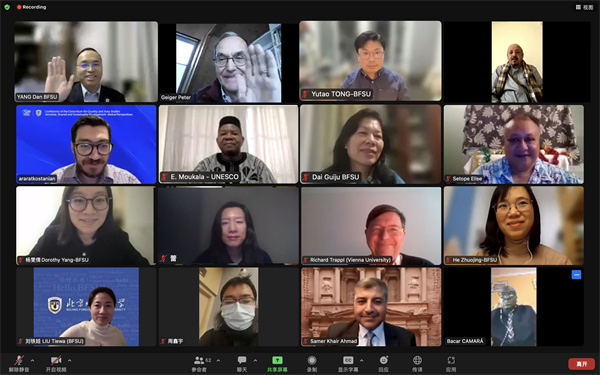
The Conference of the CCAS is held online on Dec 18. [Photo/bfsu.edu.cn]
The following guests from the Chinese side were invited to the one-day conference: Yang Dan, vice-council chair and president of BFSU and dean of the Academy of Regional and Global Governance at BFSU; Jiang Feng, council chair of Shanghai International Studies University and chairman of the Shanghai Academy of Global Governance and Area Studies; Du Zhanyuan, president of the Translators Association of China; Ning Qi, vice-council chair and vice-president of Peking University; Jia Wenjian, vice-council chair and vice-president of BFSU; Zhao Gang, council member and vice-president of BFSU; Jiang Jingkui, executive vice-dean of the Institute for International and Area Studies at Tsinghua University; Di Dongsheng, vice-dean of the School of International Studies at Renmin University of China; Jiang Xiheng, vice-president of the Center for International Knowledge on Development.
Foreign experts and professionals at the conference included Velia Govaere, professor at UNED Costa Rica and former vice-minister at the Costa Rican Ministry of Economy, Industry and Commerce; Muhammad Khalili, president of the Morocco-China Friendship Exchange Association and former Moroccan parliamentarian; Chea Munyrith, president of Cambodian-Chinese Evolution Researcher Association; Saleh Alsagri, dean of the History Department at Imam Mohammad Ibn Saud Islamic University and former cultural counselor of the Royal Embassy of Saudi Arabia in China; Edmond Moukala, director of the UNESCO Mali Office; Samer Khair Ahmad, renowned Jordanian international affairs expert, recipient of China’s Special Book Award, and previously director-general of Greater Amman Municipality’s Cultural Department; Bacar Camará, senior journalist at Radio National Guinea-Bissau, and Xinhua’s Guinea-Bissau correspondent; Kiryl Rudy, professor at Belarus State Economic University and former Belarusian ambassador to China; Khamhoung Chanthavong, director of the Confucius Institute at National University of Laos.
Yang Dan, Muhammad Khalili, and Du Zhanyuan delivered opening remarks at the opening ceremony moderated by Jia Wenjian. The idea that the interests of all nations are served through peace, progress, and security was the main point of their speeches. This multifaceted goal is tied to economics, society, politics, and culture, all of which are entwined with history and reality and cannot be isolated from engagements at local, regional and international levels. There is no better time than the present to discuss the idea in theory and practice, as well as in an inclusive, shared, and sustainable way, from a global perspective. Collaboration, achieving both lasting peace and sustainable development, requires mutual understanding and respect.
Keynote speeches were followed by two rounds of discussions and Q&A sessions led by moderators Ning Qi and Zhao Gang, respectively.
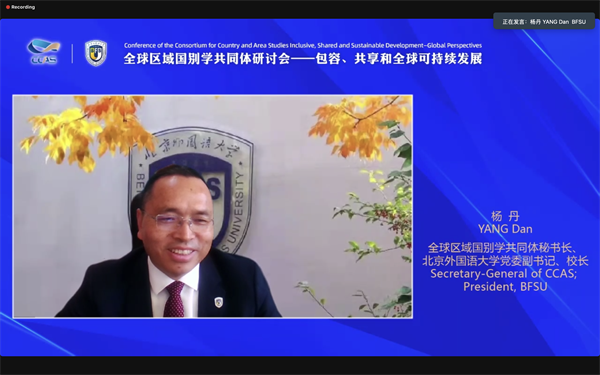
Yang Dan, vice-council chair and president of BFSU and dean of the Academy of Regional and Global Governance at BFSU, delivers a keynote speech at the conference. [Photo/bfsu.edu.cn]
In his keynote speech The Significance of Chinese Modernization to the World, Yang Dan made it clear that China has always played a significant role in global civilization. While the modernization process in China has elements similar to other modernization processes, the Chinese path to modernization is primarily distinguished by five hallmarks specific to the country's setting. They are the modernization of a vast population, the creation of common prosperity for all, a balanced growth of material and cultural ethics, harmony between humans and nature, and peaceful development and harmonious coexistence. Yang believes that Chinese-style modernization is relevant worldwide as it re-charts the course of modernization, opens up new possibilities for developing countries, creates a new form of human civilization, and rejuvenates the world.
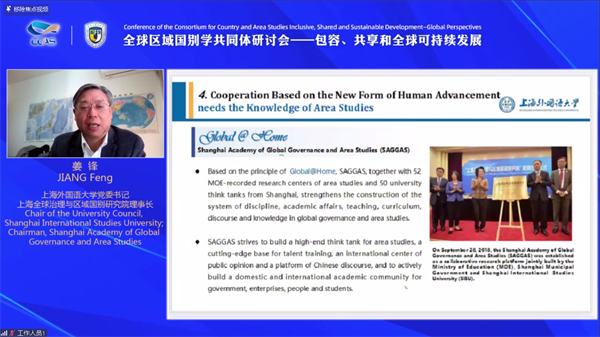
Jiang Feng, council chair of Shanghai International Studies University and chairman of the Shanghai Academy of Global Governance and Area Studies, delivers a keynote speech at the conference. [Photo/bfsu.edu.cn]
Next, Jiang Feng delivered a keynote address entitled Sustainable World Peace and Development Require New Form of Human Advancement. Common security and common development, as he noted, are the defining themes of our time, in this century of rapid global, societal, and historical changes. The path to common security and common development can be smoothed out by creating a new form of human advancement that transcends national boundaries, integrates both commonality and uniqueness, and strives for a community of shared futures based on the common values of humanity. The foundation of a true shared community is a sense of prosperity that ensues from respect for diversity, cultural exchanges, and mutual learning.
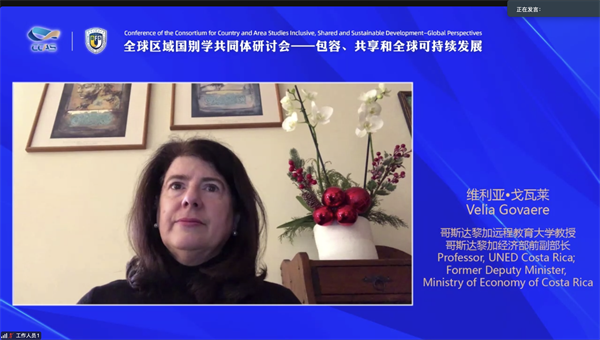
Velia Govaere, professor at UNED Costa Rica and former deputy minister at the Costa Rican Ministry of Economy, Industry and Commerce, speaks at the conference. [Photo/bfsu.edu.cn]
Velia Govaere’s speech began by highlighting that UN Sustainable Development Goals’ progress and successes are largely the result of globalization. Progress in countries cannot be put into perspective until the importance of trade liberalization underlying the ambitious SDGs is acknowledged. Indeed, this is how the significant role played by trade between Latin America and China must be seen. The “China Miracle”, lauded by the left-wing in Latin America as the paradigm for the epoch, exemplifies socially equitable economic growth, open trade, endogenous technological progress, and non-ideological global interconnectedness. The Belt and Road Initiative is the first time ever that a great power has shown respect for Latin America. That respect underscores the continued collaboration and enduring partnership.
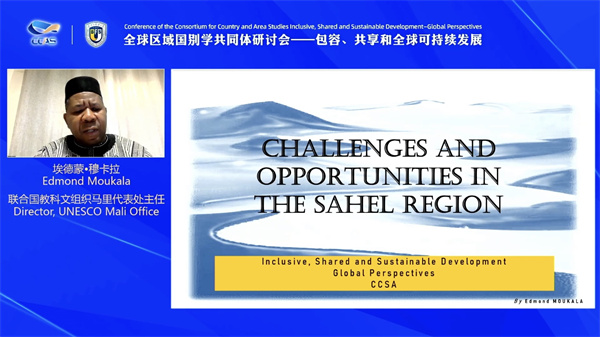
Edmond Moukala, director of the UNESCO Mali Office, speaks at the conference. [Photo/bfsu.edu.cn]
Edmond Moukala urged for the strengthening of regional cooperation and establishing early warning mechanisms to tackle intertwined threats of climate change, food shortages, and regional conflicts, and promote resilient and sustainable development. He put forward three ideas along these lines in which the first one is to increase data accessibility and quality through stronger regional and international cooperation in order to build an early warning system; the second is to develop local capabilities and boost investment to support targeted long-term adaptation, especially in agriculture and farming, to create a big enough buffer for resilient livelihoods and food security in the event of conflicts and displacement; and the third is to improve governance to address interconnected risks and crises, most notably climate change, population pressure, and violence.
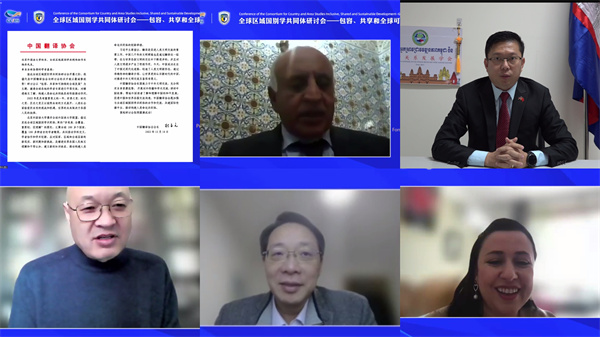
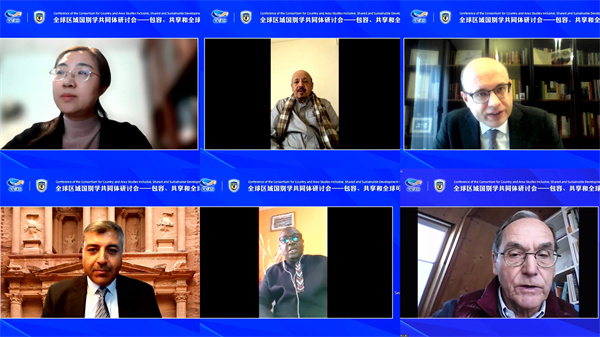
The attending scholars from China and abroad comment on the keynote speeches and conduct in-depth discussions. [Photo/bfsu.edu.cn]
The keynote speeches and subsequent well-considered commentaries sparked discussions on the conference’s theme. Participants concurred that the CCAS should uphold the guiding principles of “Diversity in Perspectives, Inclusiveness in Coverage, Originality in Research, and Depth in Understanding”, promote interdisciplinarity, academic collaboration, and academic innovation in response to new realities, issues and challenges at national, regional and global levels, and help foster unbiased perceptions and mutual understanding among people from all over the world, while also constructing a new body of knowledge.
Scholars worldwide should shoulder their responsibilities in advancing global peace and development by fostering mutual understanding through exchanges and mutual learning. Participants also called for greater efforts to stamp out the underlying causes of global development instability, encourage cross-border cooperation, and support economic recovery and inclusive growth.
The Global Index 2022 debuted at the conference along with Country and Area Studies — Global Perspectives, a forthcoming publication and the first collection of CCAS papers. These highlighted CCAS deliverables and included the introduction of the official website and WeChat account. These outputs are both evidence of BFSU’s efforts to advance country and area studies and a demonstration of the discipline’s distinctive aspects in interdisciplinary communication, diversity of viewpoints, and people-to-people exchanges.
In his concluding remarks, Yang Dan reiterated the context that gave rise to country and area studies. Massive shifts in global dynamics are changing the orientation derived from history, demanding us to put our wisdom and experience to work. If ideas are allowed to bounce off one another or even collide to provoke fresh thinking, a “Better Understanding, Better World” that outlines humanity’s shared future will not be far off. In the coming year, the CCAS will focus on the following areas: academic exchanges, academic collaboration, discipline building, academic journal creation, and platform building.
The conference was attended by CCAS members and researchers from academic institutions at home and abroad. It was covered by a slew of media outlets and livestreamed on Zoom, with real-time viewership peaking at 4,000.